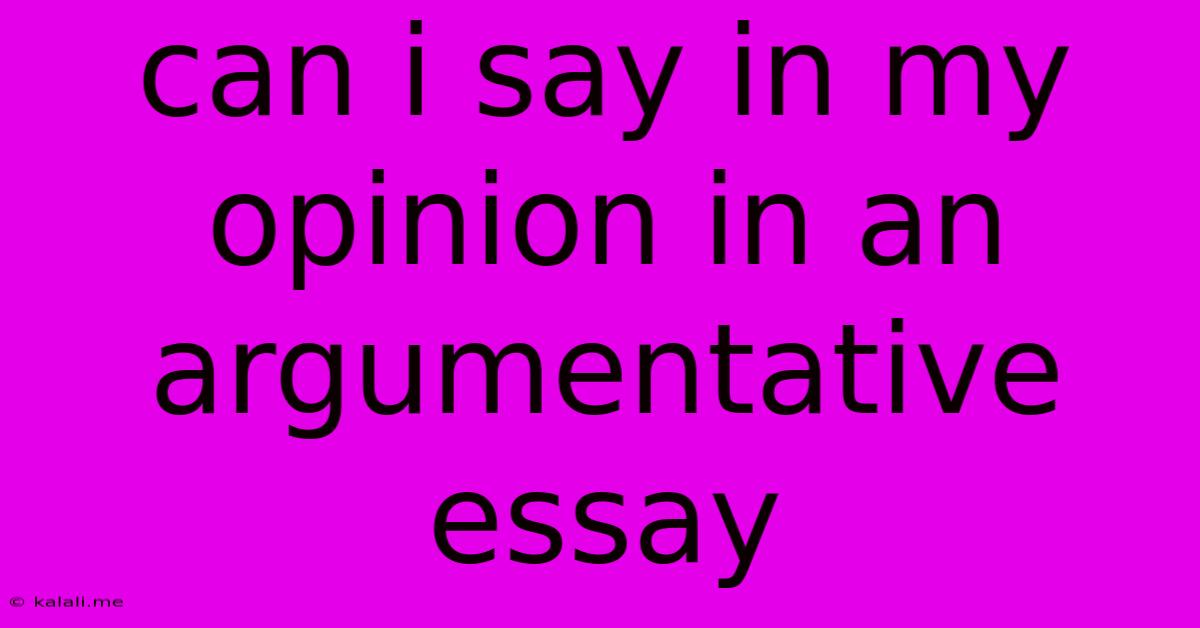Can I Say In My Opinion In An Argumentative Essay
Kalali
May 30, 2025 · 3 min read

Table of Contents
Can I Say "In My Opinion" in an Argumentative Essay? A Guide to Persuasive Writing
The question of whether to use phrases like "in my opinion" or "I think" in an argumentative essay is a common one, sparking debate among students and writers alike. The short answer is: it depends. While these phrases can sometimes be appropriate, they often weaken your argument and detract from its overall persuasiveness. This article will explore when and why you might—or might not—want to include such subjective language in your essay.
Meta Description: Learn whether using phrases like "in my opinion" strengthens or weakens your argumentative essay. This guide explores persuasive writing techniques and helps you craft a compelling, authoritative piece.
The core purpose of an argumentative essay is to convince your reader of your viewpoint. You do this by presenting a strong thesis statement and supporting it with evidence, logical reasoning, and credible sources. Phrases like "in my opinion" or "I believe" inject unnecessary subjectivity into what should be a reasoned, objective analysis. They suggest uncertainty and can undermine your authority on the topic.
When "In My Opinion" Might Be Acceptable (Rarely)
There are limited situations where a subjective statement might be appropriate:
- Introducing a counterargument: If you're acknowledging an opposing viewpoint before refuting it, briefly stating "Some might argue..." or "It's been suggested that..." can be a smooth transition. However, even here, directly stating your opinion is usually avoidable. Focus on presenting the opposing view objectively, then dismantle it with your evidence.
- Personal Anecdotes (with caution): While an argumentative essay primarily relies on factual evidence, a brief, relevant personal anecdote can add a human touch and make your argument more relatable. However, ensure this anecdote serves to support your claim, not replace solid evidence. Avoid overly subjective statements within the anecdote itself.
- Extremely subjective topics (with extreme caution): Certain topics, such as ethical dilemmas or interpretations of art, might inherently involve more subjective opinions. Even then, framing your argument with strong evidence and reasoned analysis remains crucial. Minimize direct statements of personal belief.
Why Avoiding Subjective Language Strengthens Your Argument
Here's why omitting "in my opinion" and similar phrases makes your essay more impactful:
- Establishes Authority: Presenting your argument confidently, without hedging your claims, establishes you as a knowledgeable and credible source. This makes your reader more receptive to your perspective.
- Creates a Stronger Tone: A confident, assertive tone is vital in persuasive writing. Using phrases like "I think" weakens this tone, making your argument appear less certain and less convincing.
- Improves Clarity and Flow: Removing unnecessary qualifiers improves the readability and flow of your essay. It allows your argument to unfold more smoothly and directly.
- Enhances Objectivity: Argumentative essays aim for objectivity, even when advocating a specific position. By focusing on evidence and logic rather than personal beliefs, your argument becomes more convincing and less vulnerable to criticism.
Alternatives to "In My Opinion"
Instead of stating your opinion directly, focus on presenting your argument with strong evidence. Use language that expresses conviction without explicitly mentioning your personal feelings:
- Strong Verbs: Use action verbs that convey confidence: "demonstrates," "reveals," "establishes," "proves."
- Direct Statements: State your claims directly and confidently. For example, instead of "I think pollution is harmful," write "Pollution is demonstrably harmful."
- Data and Evidence: Back up your assertions with reliable statistics, research findings, and credible sources.
In conclusion, while the occasional subjective statement might have a place in specific contexts, generally avoiding phrases like "in my opinion" is recommended for a strong, persuasive argumentative essay. Focus on presenting a reasoned, evidence-based argument that stands on its own merit, demonstrating your expertise and convincing your reader of your position.
Latest Posts
Latest Posts
-
Do I Need To Replace Brake Rotors
Jun 01, 2025
-
Does The Bible Say The Earth Doesnt Move
Jun 01, 2025
-
Dashboard Lights Flickering Car Wont Start
Jun 01, 2025
-
Condition Helms Template Compare Strings Arguments
Jun 01, 2025
Related Post
Thank you for visiting our website which covers about Can I Say In My Opinion In An Argumentative Essay . We hope the information provided has been useful to you. Feel free to contact us if you have any questions or need further assistance. See you next time and don't miss to bookmark.